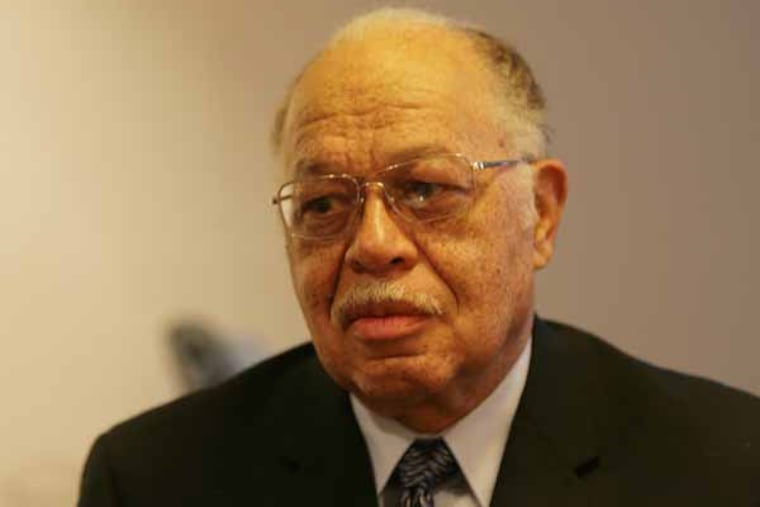Work at Gosnell clinic took its toll, relative says
Elizabeth Hampton was bound to Kermit Gosnell by family and finances. Gosnell, a prosperous West Philadelphia family doctor who also provided abortions to poor women, was married to Hampton's "foster sister," Pearl. Hampton and husband James Johnson were on the payroll of Gosnell's clinic and, with their daughter and four grandchildren, lived in a house Gosnell owned.

Elizabeth Hampton was bound to Kermit Gosnell by family and finances.
Gosnell, a prosperous West Philadelphia family doctor who also provided abortions to poor women, was married to Hampton's "foster sister," Pearl. Hampton and husband James Johnson were on the payroll of Gosnell's clinic and, with their daughter and four grandchildren, lived in a house Gosnell owned.
But the security of Gosnell's name came at a price: emotional stress, alcoholism, criminal charges, and, on Wednesday, testimony against her brother-in-law at his murder trial in Philadelphia Common Pleas Court.
Hampton, 55, was on the witness stand for two hours, talking about life in Gosnell's extended family and inside his Women's Medical Society clinic at 3801 Lancaster Ave.
She will again be questioned by Gosnell lawyer Jack McMahon when the trial resumes Thursday.
Hampton was one of nine Gosnell employees charged after a county investigating grand jury report in January 2011 accused Gosnell of performing illegal late-term abortions at the clinic and killing babies born alive and viable.
Gosnell, 72, faces seven counts of first-degree murder in the case of the newborns and could be sentenced to death if the jury finds him guilty.
Hampton, who did housecleaning at the clinic and later answered telephones, was charged with lying to the grand jury about the Nov. 19, 2009, death of Karnamaya Mongar. Prosecutors allege that Mongar, 41, of Virginia, was administered too much Demerol by Gosnell's untrained staff and died during an abortion.
Gosnell is charged with third-degree murder in Mongar's death.
Hampton pleaded guilty to perjury under a deal with prosecutors in which she testifies in exchange for leniency when she is sentenced.
Questioned by Assistant District Attorney Joanne Pescatore, Hampton described a close relationship growing up in a foster home with Pearl Gosnell.
When they became adults, there was a period of estrangement, Hampton said, but in the late 1990s, they reconnected and spoke daily from then on.
In 1999, Hampton testified, the Gosnells offered her a job at the clinic doing general cleaning and sterilizing medical instruments. The pay was $10 an hour, cash, "under the table."
But in 2002, Hampton quit "because of a disagreement with Barron" - Gosnell's middle name - a disagreement she did not describe.
Hampton said she spent the next four years struggling with alcoholism, which she said made her "violent" when drunk.
She was sober by 2006, Hampton said, and Pearl Gosnell asked her to return to her clinic job.
Hampton did - reluctantly - telling the jury, "I felt obligated to work there."
Hampton didn't last the year.
Among her cleaning duties, Hampton said, was cleaning out the suction machines used to remove fetal remains during abortions.
Hampton testified that she would pour the jar of red liquid from the machine down a sink drain and turn on the garbage disposal. She said she did not know if the liquid contained fetal body parts.
"I left because of things I saw. I went out that night and started drinking at the bar across the street," Hampton said, her voice choking with emotion. "I fell off the wagon."
The next day, Gosnell called and asked her to come to work. Hampton said she told him, "I'm not coming back."
Pearl Gosnell called, and Hampton said she hung up.
Two days later, certified eviction notices arrived at her West Philadelphia house, but Hampton said the Gosnells never followed through.
In October 2009, Hampton returned to the clinic once more, this time to answer telephones, she testified.
A month later, Mongar died, and then, on Feb. 18, 2010, a state and federal task force raided the clinic as part of an investigation into whether Gosnell was selling prescriptions for controlled narcotics.
Questioning Hampton, McMahon focused on the Gosnells' generosity to her and her family.
"They gave you a place to live, to reside, and a job," McMahon said, noting that Hampton and her family were still living in Gosnell's house rent-free.
Hampton said authorities told her to stop paying rent after the charges were filed in 2011. "I still pay the taxes and water bills."